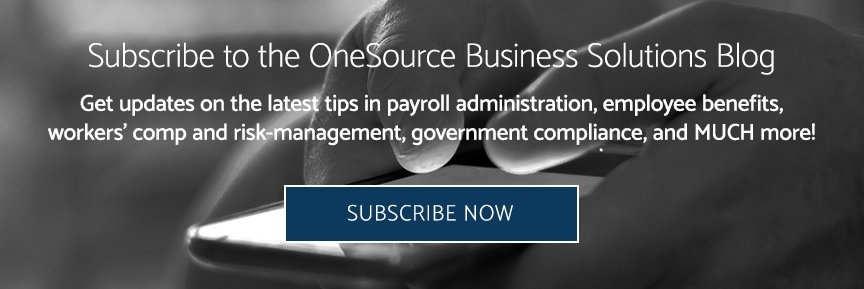OneSource Business Solutions Blog
How to build a great internship program
Developing an internship program is an excellent strategy for investing in your organization’s future successes. Internships are an opportunity for students and new graduates to gain work experience in a professional setting by working under the supervision of a mentor. The intern placement is a set period of time with an understanding by the employer and intern that there’s no guarantee of employment at the end of the program.
How do employers benefit from an Internship Program?
One significant advantage to providing internships is the opportunity to select and develop your future talent. This is your opportunity to evaluate and screen potential employees prior to making a full-time position offer, which leads to financial savings. Employers have reported converting more than half of their interns into full-time employees. If hired in a permanent position, previous interns acclimate faster to their new roles and have a shorter on-board learning curve than non-intern hires.
The details of the internship program should be formally documented on paper before you begin recruiting interns. A clear understanding of how the program works is essential for maximizing everyone’s time. In addition, it has been shown that employers who take adequate time at the beginning of the internship to orient the student reap productivity more quickly than those who don't. This is the beginning of a great work culture.
Is your business ready?
If you’re ready to embark on a new journey and start an internship program, you need to ask yourself a couple of questions to make sure you're choosing the right candidate for your company.
- Are there specific projects or assignments that will provide quality working and learning opportunities for an intern?
- Can the company commit time to developing a student and offer insight into the organization?
- Does the company have a desire to help mold the future of the workforce’s talent?
If you answered yes to the above questions, then you’re ready for an internship program. With that being said, remember to follow your state’s laws and regulations and the federal Fair Labor Standards Act. We can also help with all rules and regulations as we’re a local professional employment organization that provides comprehensive HR services for small to mid-size businesses.
Long or Back-to-Back Meetings
It's difficult for employees to be productive when they are stuck in unnecessarily long meetings. There's nothing worse than setting up for a busy day only to be called into a two-hour meeting. And this is no different for remote workers. When you're working remotely, it's so easy to call a video chat or a Zoom meeting that ends up going on for way too long.
While meetings are necessary to promote teamwork and keep everything on the same page, back-to-back meetings that last hours are unnecessary and can sap productivity. In an office setting, people usually get breaks between meetings. They may have to walk from one meeting to the next, but this isn't true for remote work. Remote employees can find themselves stuck in virtual meetings for half their day or more.
As a manager, be sure to schedule regular meetings but stick to the schedule. End meetings according to that schedule, and keep spur-of-the-moment Zoom calls to a minimum. This can help keep employees engaged and productive while keeping them feeling like part of the team.
Finding the Right Intern for Your Organization
- High School: High School students are interested in developing interpersonal and professional skills. These skills will allow them to discover what areas they excel in, and they could potentially remain with the organization through college.
- College Student: A young adult enrolled in college–a college intern–could be beneficial for your organization because of their experience in and out of the classroom. An intern program gives them a practical application of what they’ve learned in their schooling.
- Career Changer: By transitioning to a new industry, this individual may be hoping to expand a professional network in this new field and incorporate their professional skills into your organization.
Paid interns make ideal workers. They’re hungry to learn, eager to make a good impression, and willing to perform even the smallest tasks. The overall small amount of money employers spend on intern wages and benefits is a good investment, because it often produces future, long-term employees. Overall, think of your intern’s role in the long view. Their experience isn’t just for the summer, it’s really forever. You’re creating a reference point in their career—for better or worse.
Although, as a Professional Employer Organization (PEO), we don’t directly help with developing an internship program, we are here as an extension of your human resources team and happy to share our experiences and experiences with our other clients. Contact us today to learn more.
Recent Posts
Posts by Topic
- HR Outsourcing (37)
- Employee Benefits (14)
- Payroll & HR Administration (5)
- Strategic Planning & Research (5)
- Company Culture (4)
- HR Compliance (4)
- Industry – Professional Services (4)
- PEO (4)
- Workers’ Comp (4)
- Employee Turnover (3)
- OneSource PEO Company News (3)
- performance management (2)
- Navigating COVID-19 (1)
- manufacturing industry (1)
